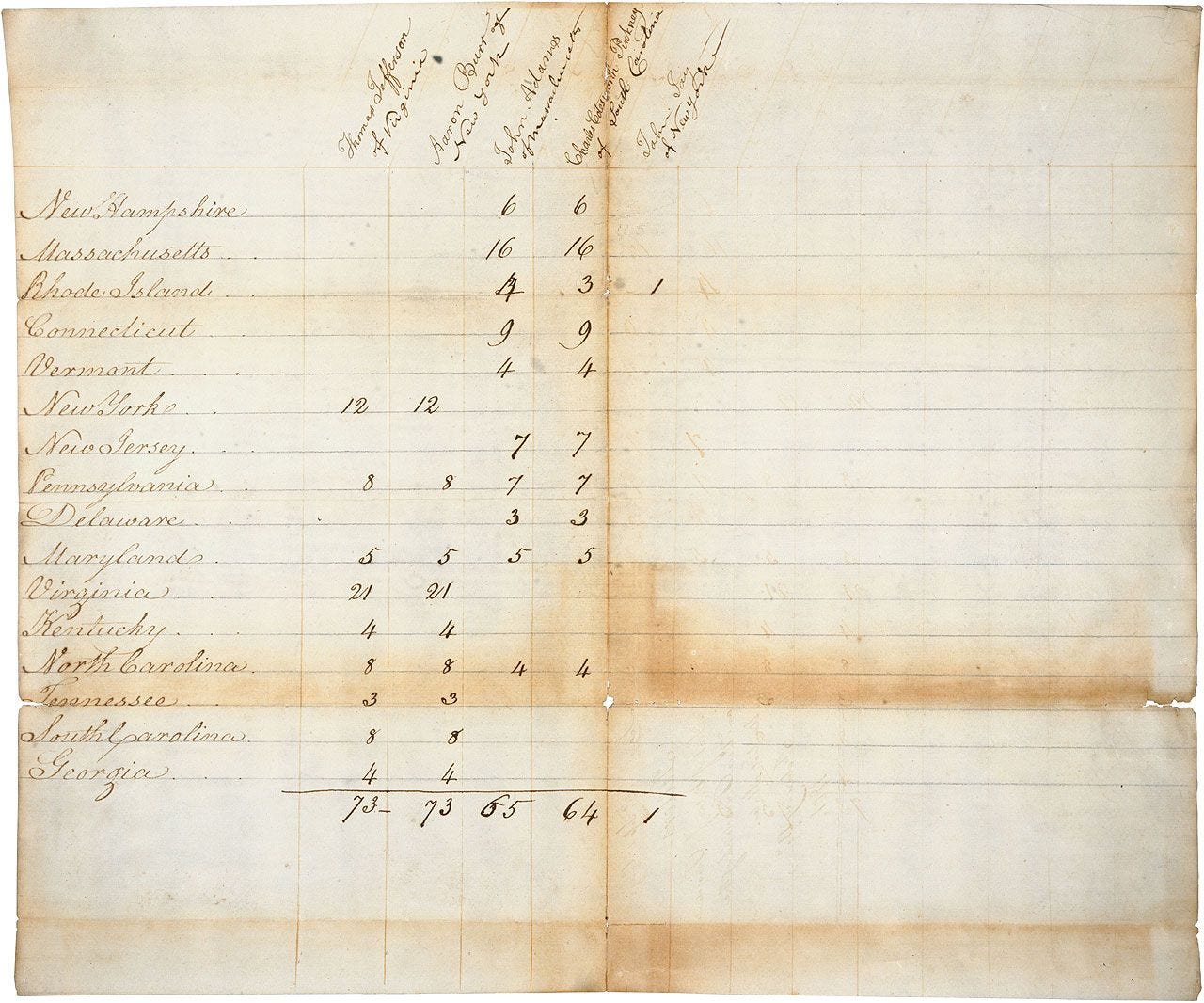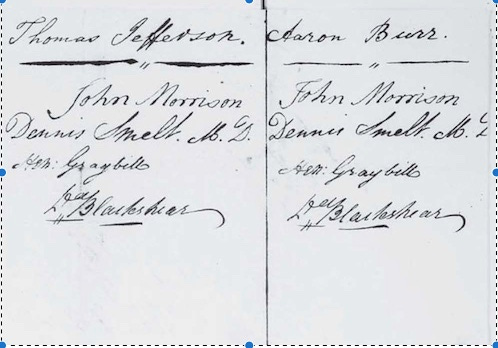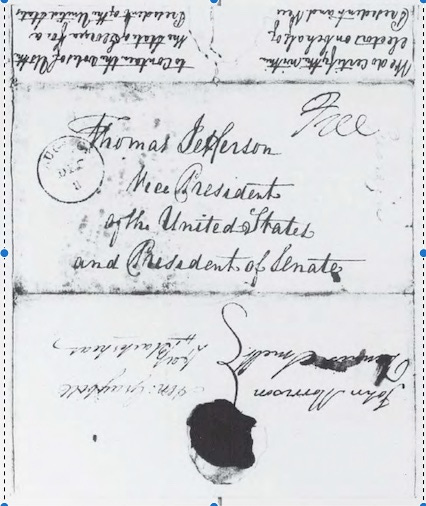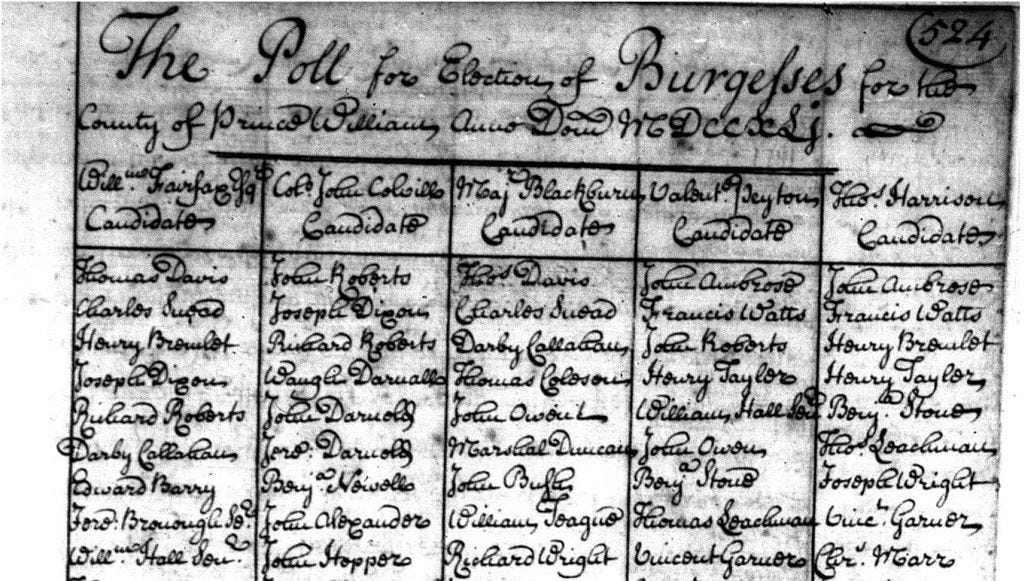No, Jefferson didn't rig the 1800 vote count
Sorry, Trump dead-enders. You should have read that law review article to the end.
Backbencher from time to time posts contributions from other writers. This essay is by Holly Brewer, Burke Professor of American History at the University of Maryland and author of By Birth or Consent: Children, Law, and the Anglo-American Revolution in Authority (2005).
You may have heard that Rep. Louie Gohmert (R.-Tex.) filed suit Sunday against Vice President Mike Pence demanding that, when Pence counts electoral ballots on January 6, he toss out electoral ballots from Arizona, Georgia, Michigan, Pennsylvania and Wisconsin and substitute ballots cast by Republican “shadow electors” from these states. Pence declined to sign on to Gohmert’s scheme, but in a Dec. 27 tweet (“See you in Washington, DC, on January 6th. Don’t miss it. Information to follow!”) Trump appeared to endorse it.
Let’s don’t waste our time over whether Pence, even if he wanted to alter the election’s outcome, would have legal and constitutional authority to do so. By broad agreement, he would not. What interests me is an historical argument that’s been forwarded on Gohmert’s behalf based on the notion that Vice President Thomas Jefferson rigged the 1800 election for himself by including in his vote count (pictured above) a defective electoral ballot from Georgia. And guess what? That’s wrong, too.
The claim is based on a 2004 article (“Thomas Jefferson Counts Himself into the Presidency”) by two constitutional law scholars, David Fontana of George Washington University and Bruce Ackerman of Yale Law School. Writing in the aftermath of the 2000 presidential election, Fontana and Ackerman noted that just as Al Gore was tasked by the Constitution with counting electoral ballots in his contested race against George W. Bush, so too was Jefferson tasked with counting electoral ballots in his contested race against John Adams. But in Jefferson’s case, Fontana and Ackerman argued, there was a technical problem in the format of Georgia’s four electoral votes—votes that were crucial to Jefferson’s victory over Adams. The House and Senate “tellers” who were appointed to open and record the electoral ballots noted the irregularity. Jefferson did not. He merely entered the votes into the record.
Fontana and Ackerman were surprised that historians had failed to take note of Jefferson’s apparent power grab, and wondered what kind of precedent it set. Might Gore have called the 2000 election for himself by tossing out inconvenient electoral ballots, following Jefferson’s thrilling example? In exploring at length evidence of Jefferson’s seeming misbehavior, Fontana and Ackerman left behind a trail of quotable and condemnatory speculations for future MAGA partisans to resurrect.
But before you get too excited, rest assured that Jefferson did not establish any precedent to support Gohmert’s preposterously expansive view of vice-presidential power. To whatever extent the constitutional question rests on the historical one—and we could argue about that one all day—there is no need to reconsider it, because there was no substantive problem, technical or otherwise, with Georgia’s electoral ballot in 1800. Fontana and Ackerman themselves conceded this at the end of their inquiry (well past whatever point the Trump dead-enders now eagerly citing the article stopped reading).
The irregularity observed by the congressional tellers was that the Georgia ballot was in a slightly different format than the ballots from the other states (of which, in 1800, there were 16). The other electoral ballots specified that the electors had certified particular stated winners in their state. The Georgia electoral ballot did not.*
Sounds fishy, right? But to say the certified winners were not identified on Georgia’s electoral ballot is not to say that Georgia failed to identify those winners to Congress. It did. It merely furnished that information on the envelope in which the electoral ballot was delivered. (In their article, Fontana and Ackerman don’t do the best job of explaining this.)
Allow me to illustrate with a few documents.
Let’s examine first what a standard electoral ballot looked like in 1800. The example reprinted below is not from 1800—it’s Virginia’s electoral ballot from 1789—but the format is the same. Note the recitation of Virginia law establishing how electoral ballots are cast; the tally of actual votes (George Washington received 10); the signatures (with seals); and the note affirming that this is the certified result of the Virginia electors’ vote.
Now let’s look at Georgia’s electoral ballot in 1800. We see tallies for Thomas Jefferson and Aaron Burr in the form of four electors’ signatures. But are these the right electors? We don’t see it anywhere stated that this is Georgia’s certified electoral tally.
Now let’s look at the envelope that contained Georgia’s electoral ballot. Lo and behold, it affirms that the contents represent a certified tally of Georgia’s electors: “We do certify the within to Contain the votes of Us the electors on behalf of the State of Georgia for a President and Vice President of the United States.” The electors’ signatures on the envelope are identical to the ones on the ballot.
Lest you conclude some conspiracy was afoot to deceive Congress, it was reported widely at the time in Georgia newspapers and in newspapers outside the state that Jefferson and Burr won the state. Georgia’s own congressional delegation, which included two legislators aligned with Adams’s Federalist party, did not object when Jefferson assigned the state’s electors to himself. Contemporary Georgia state records also show that it was observed and recorded widely that the state went for Jefferson.
As an historian, I offer a simple explanation why this episode was overlooked until Fontana and Ackerman came along. Nobody objected publicly to Jefferson’s claiming Georgia’s electoral votes, either at the time or afterward. The political culture of that period was lively, to say the least, with all sorts of wild political accusations surfacing in the public prints, and Jefferson didn’t lack for enemies. Had anyone smelled a rat, that person wouldn’t have lacked opportunities to accuse Jefferson of stealing the election when he counted electoral votes. But none did. No smoke, no fire.
As someone who looks frequently at voting records from this period, let me also point out that the format for the electoral ballot from Georgia, though it didn’t match that for other states’ electoral ballots, did match that for tallies in other types of elections, and that an oral process of voting and counting was part of the reckoning. Here’s an example from Prince William’s County, Virginia, in 1741. Note the names at the top of those standing for election, with the list underneath of those who voted.
The notion of oral voting may horrify you, but the sanctity of the secret ballot that we take for granted today is based on a practice introduced only gradually over the 19th century, in some states faster than others. Democracy was much less private in 1800 than it is today. The drawbacks are obvious, but one advantage was that it was difficult to misrepresent the results.
Within that public context, the formalized participation in the electoral count of congressional tellers makes perhaps a bit more sense. The process left the vice president without any practical means to choose which votes to count and which not to without drawing severe condemnation. And anyway the founders, whatever their other defects in foresight or intent, never would have given such power to one man. Jefferson himself was among the most outspoken critics of autocratic power, which he termed “elective despotism.” The revolutionary who worried “that the corrupt will of no one man might in future oppress him,” he wrote in 1782, “must stand confounded and dismayed when he is told, that a considerable portion of that plurality had meditated the surrender of them into a single hand, and, in lieu of a limited monarch, to deliver him over to a despotic one!”
Jefferson did not put his thumb on the scales in counting electoral ballots in 1800, any more than he did in 1796, when he lost the presidency narrowly to Adams, and could have protested Vermont's electoral ballot (which was more problematic than Georgia's four years later). If Pence were to try to do so—ignoring electoral votes in not one but six states—he wouldn’t be building on a precedent created by Jefferson or any other vice president. He’d be committing treason.
*Why do I say “winners” rather than “winner”? Because in those days each elector voted for two presidential candidates, of whom there were a total of five in 1800: Adams; Charles C. Pinckney, Adams’s de facto running mate; Jefferson; Aaron Burr, Jefferson’s de facto running mate; and John Jay. The candidate who came in second place would be vice-president. But an electoral tie between Jefferson and Burr left it to the House of Representatives to decide which would be president and which vice-president. After much frenzied politicking, the House chose Jefferson. Four years later the Twelfth Amendment was ratified to prevent this from happening again by separating votes for president and vice-president.







Thank you, Holly Brewer, for your extraordinary, meticulous and impactful scholarship. Your voice needs to be widely heard.